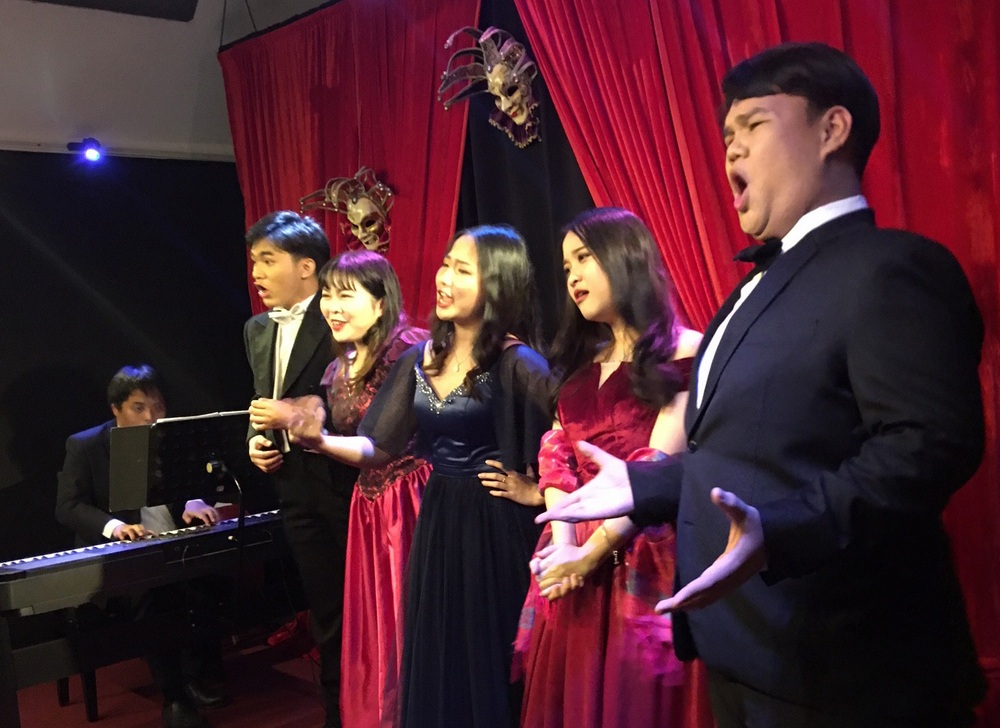
It was a full house at the much-anticipated concert given by talented vocal students from the College of Music at Mahidol University. All five are students of the distinguished singing teacher Professor Nancy Tsui-Ping Wei and they presented a well-planned and fascinating programme.
In typical fashion, much thought had been given to the visual aspect to the concert – a stage decorated in crimson and black with the singers appearing in the same matching colours. Even our host Ben Hansen appeared in black shirt and crimson bow tie.
This attention to detail ran through the concert too and it was clear that careful planning had been given to the choice of songs and the order in which they were presented. People sometimes forget that singers don’t simply walk on to the stage and perform. That daunting moment is the culmination of many hours of rehearsal and preparation over a period of weeks and sometimes months. All the songs – some of them technically challenging – were performed entirely from memory.
Mozart’s aria Ah guarda sorella from the opera “Così fan tutte” opened the concert and featured the two sopranos Pariyachart Sitthidamrongkarn and Duangamorn Fu. With commanding stage presence they gave a confident performance of the piece with a good sense of ensemble and some lovely close-harmony singing. In contrast, it was followed by arias from the opera “The Old Maid and the Thief” by Menotti, commissioned for a radio performance in 1939. Baritone Jorn Yasavudhi sang the charming folk-like aria When the Air Sings of Summer confidently and soprano Lim Sin Mei sang Steal Me, Sweet Thief with good stage presence and a convincing sense of style.
Jorn and Duangamorn gave a compelling performance of Lehár’s lively duet We Met a Long Time Ago from the operetta “The Merry Widow”. They sang with a good sense of phrasing and were given tremendous support from pianist Anant Changwaiwit, a brilliant concert pianist in his own right who played superbly throughout the evening. His performance of the keyboard accompaniment to Handel’s aria Da tempeste il legno infranto (sung by Pariyachart) was absolutely spot-on with superb articulation. Pariyachart gave a fine performance of this difficult aria with its many long melismatic passages: a real challenge for any singer.
The grandly-named composer Martino Stanislao Luigi Gastaldon is known today for a single song written in 1881 entitled “Musica proibita” (“Forbidden Music”). Jatupol Pinthip has a light baritone voice, almost a tenor in voice quality and he gave a pleasing performance of the song with good intonation, clear Italian diction and negotiated the tricky modulations remarkably well. He and Pariyachart gave a lovely performance of Bei Männern welche Liebe fühlen, from Mozart’s “The Magic Flute” in which their voices blended perfectly with excellent intonation, a good sense of phrasing and clear articulation.
I was impressed with Duangamorn’s singing of the aria Chi il bel sogno di Doretta potè indovinar? from Puccini’s little-known opera “La Rodine”. She performed the aria with excellent control especially on the challenging high notes. For me it was one of the highlights of the evening. The second highlight was the jolly Wie die Weiber man behandelt? from Lehár’s popular operetta “The Merry Widow”. It was a well-staged ensemble piece with good diction, excellent voice blending and confident presentation. The audience approved enthusiastically.
After the intermission, another highlight was Mendelssohn’s much-loved song Auf flügeln des Gesanges sung by Duangamorn and Jorn – a delightful performance in which their voices blended perfectly. Pariyachart then gave a well-staged and competent performance of Menotti’s Monica’s Waltz with beautifully articulated piano playing from Anant.
So competent and musical is his piano playing that frequently my ears were drawn to his sympathetic and technically accomplished playing. I enjoyed Jatupol’s dramatic performance of Mozart’s Se vuol ballare, Signor Contino and I think Duangamorn excelled herself in a touching performance of the song Oh! Quand je dors by Franz Liszt. Her voice floated serenely above a sublime piano accompaniment. Jorn offered a compelling performance of the waltz-like Wien, du Stadt meiner Träume and Lim Sin Mei was probably at her best in Verdi’s aria Volta la terrea fronte alle stelle in which her phrasing and articulation were excellent and blended well with the piano.
Duangamorn provided another highlight of the evening – the famous aria from Franz Lehár’s “The Merry Widow”, Es lebt’ eine Vilja. Helped by off-stage baritones she sang with confidence, broad phrasing and excellent intonation. The concert culminated in another popular ensemble number Lehár’s Dein ist mein ganzes Herz which brought the concert to a satisfying conclusion with a great deal of enthusiastic applause and cheering from the audience.




